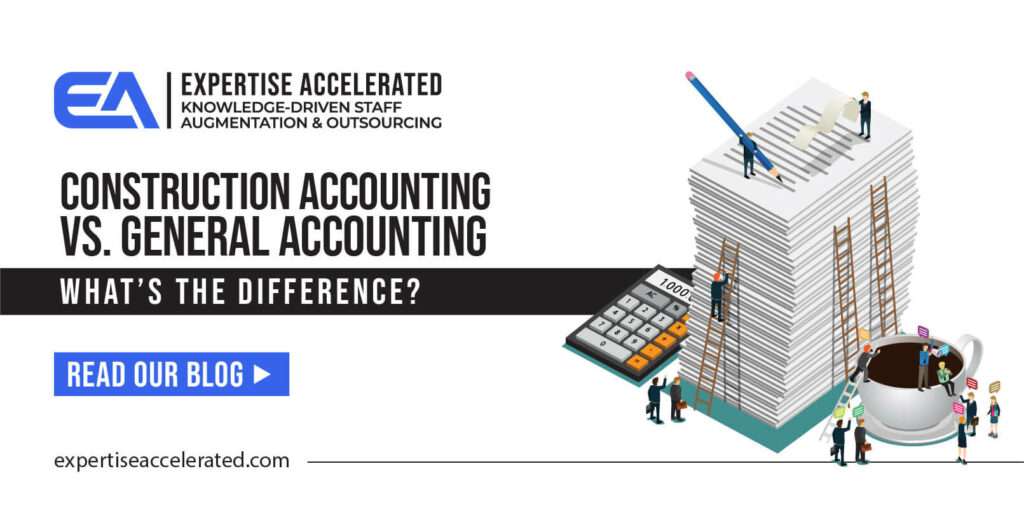Understanding the Relevance of Building Bookkeeping for Effective Project Administration

Duty of Construction Accountancy
Building accountancy acts as the backbone of monetary management in the construction industry, making sure that tasks are completed within budget plan and monetary purposes are met. construction accounting. This specialized accounting technique addresses the unique challenges encountered in building tasks, including varying project periods, varying prices, and numerous stakeholders
One of the main duties of building accountancy is to give exact expense estimate and tracking throughout the job lifecycle. This promotes educated decision-making, making it possible for project supervisors to change sources and timelines effectively. Additionally, building and construction accountancy boosts capital monitoring by monitoring accounts receivable and payable, thus making certain that funds are readily available for timely settlements to subcontractors and vendors.
It gears up project supervisors with the necessary monetary information to prepare in-depth economic statements, which are vital for audits and monetary evaluations. Inevitably, the role of building accountancy expands beyond simple financial tracking; it is essential to calculated planning and operational performance, driving the success of building and construction jobs in a competitive landscape.
Secret Components of Construction Accounting

Budgeting establishes a financial structure that guides project execution, enabling supervisors to allocate sources successfully and expect prospective economic obstacles. Accurate price tracking is essential for surveillance expenditures in real-time, aiding to identify differences between predicted and real costs. This makes it possible for prompt modifications to maintain the job on budget.
Additionally, monetary coverage offers stakeholders with a clear image of the project's financial health and wellness. Regular records, such as revenue and loss statements and capital evaluations, help with notified decision-making and enhance openness among all celebrations included.
Additionally, conformity with industry laws and audit criteria is vital. This ensures that monetary techniques are not only efficient but likewise lawful, safeguarding the organization versus lawful effects. By integrating these vital components, building bookkeeping cultivates a structured technique to taking care of funds, eventually adding to the effective conclusion of building tasks.
Benefits for Project Supervisors
Leveraging effective construction accountancy practices provides project supervisors with a plethora of benefits that improve both operational efficiency and financial oversight. One considerable advantage is boosted spending plan monitoring. Accurate monitoring of expenses and earnings enables project managers to check economic efficiency in actual time, making sure jobs remain within budget and promoting prompt modifications when necessary.
Moreover, building and construction accountancy simplifies capital administration, allowing project supervisors to expect monetary needs and maximize source allowance. By understanding cash inflows and outflows, they can much better handle settlements to suppliers, employees, and subcontractors, thereby staying clear of costly hold-ups.
Additionally, durable bookkeeping systems give extensive coverage capabilities. Project managers can create reports that use insights right into task success, price variances, and source utilization. This data-driven technique cultivates informed decision-making, enabling managers to identify prospective concerns proactively and implement rehabilitative measures.
Finally, adherence to building and construction accounting criteria guarantees compliance with regulatory and lawful needs, minimizing the risk of disagreements or fines. On the whole, effective construction bookkeeping furnishes job supervisors with the tools essential to drive project success, enhance stakeholder confidence, and promote long-lasting organizational growth.
Usual Challenges in Building And Construction Accounting
Many project supervisors experience substantial obstacles in building and construction accounting that can hinder task success. Among the main difficulties is the intricacy of tracking numerous task websites, each with unique budget plans, timelines, and resource allowances. This requires precise interest to information, which can be frustrating without a robust bookkeeping system in position.
In addition, rising and fall material prices and labor prices can complicate budget plan administration, making precise forecasting difficult. Project managers often struggle to integrate these prices with real expenses, resulting in potential monetary disparities.
Additionally, building accounting involves conformity with different regulations, consisting of tax responsibilities and labor laws. Browsing these guidelines can be difficult, especially for managers that may not have a solid bookkeeping background.
Another considerable challenge is handling capital, which is important in the building sector. Delays in invoicing, repayments from clients, or unforeseen task modifications can create cash money click for source flow lacks, jeopardizing the project's development.
Last but not least, efficient interaction between task managers, accountants, and area teams is important. page Misunderstandings can cause incorrect economic coverage, even more making complex project administration initiatives. Attending to these challenges proactively is vital for effective building audit.

Ideal Practices for Effective Audit
While navigating the complexities of construction bookkeeping can be daunting, embracing best practices can considerably improve financial administration and job success. One essential practice is keeping exact and prompt records. Implementing robust accountancy software program tailored to building jobs can simplify data entry, invoicing, and reporting, saving and lowering mistakes time.
Furthermore, establishing a clear budget plan and normal surveillance against this budget are important. Employing a system of routine financial testimonials permits task managers to identify differences early, facilitating prompt decision-making. It is also vital to different task expenses into direct and indirect categories, allowing clearer understandings right into productivity.
Another best method entails fostering open interaction amongst all stakeholders. Regular updates and collaborative discussions about economic condition can guarantee everybody is lined up and informed. Educating personnel in construction-specific accountancy concepts even more boosts expertise and precision.
Last but not least, ensuring compliance with appropriate audit requirements and guidelines is non-negotiable. Routine audits and interior testimonials add to openness and accountability, developing trust fund with stakeholders and clients. By concentrating on these ideal practices, construction companies can maximize their accountancy procedures, eventually driving job YOURURL.com success and monetary security.
Conclusion
In conclusion, building and construction bookkeeping plays a pivotal duty in guaranteeing effective project monitoring by helping with accurate monetary oversight and boosting decision-making. By incorporating vital components such as expense estimate, money flow management, and compliance, job managers can navigate typical obstacles and leverage finest techniques for efficient bookkeeping. Eventually, a durable building and construction bookkeeping framework not just safeguards spending plan stability however also adds to the overall monetary wellness of construction jobs, cultivating sustainable success within the sector.
By integrating these key elements, building accountancy promotes an organized approach to managing monetary resources, inevitably adding to the effective completion of construction tasks.
Exact monitoring of expenses and profits allows job supervisors to keep track of financial efficiency in actual time, ensuring jobs continue to be within spending plan and assisting in prompt changes when necessary.
Project managers can generate records that offer understandings into job productivity, price variances, and source utilization.Several project supervisors experience substantial obstacles in building and construction accounting that can hinder project success. construction accounting. Inevitably, a robust construction audit framework not just safeguards budget plan stability but also contributes to the general monetary health and wellness of construction tasks, cultivating sustainable success within the market
 Angus T. Jones Then & Now!
Angus T. Jones Then & Now! Ben Savage Then & Now!
Ben Savage Then & Now! Lark Voorhies Then & Now!
Lark Voorhies Then & Now! Monica Lewinsky Then & Now!
Monica Lewinsky Then & Now! Richard Dean Anderson Then & Now!
Richard Dean Anderson Then & Now!